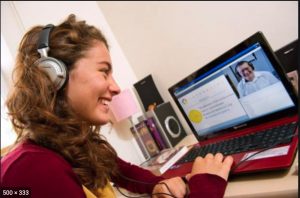 Online tutoring may not seem like an obvious choice for those homeschooling families who are already strapped for resources, but for some, online tutoring could be an excellent choice for the homeschooling child. In fact, online tutoring is becoming more popular, and for good reason. Here are some of the key advantages and disadvantages to online tutoring.
Online tutoring may not seem like an obvious choice for those homeschooling families who are already strapped for resources, but for some, online tutoring could be an excellent choice for the homeschooling child. In fact, online tutoring is becoming more popular, and for good reason. Here are some of the key advantages and disadvantages to online tutoring.
If you’re a homeschooling parent, then you’ve probably considered at least giving some thought to online tutoring for your school children. Online or private tutoring to help your child during Covid, instantly makes the prospect of late night, dollar-signs-filled tutoring dollars sound almost too good to be true. But there are still some affordable or even free online tutoring available to homeschooling parents. One of the major advantages of online tutoring is the flexibility that it allows the homeschooled child to have at his or her disposal. Since there are so many choices, the parent can customize lessons and even the format of the lessons–sometimes with the help of a live tutor–to best suit the needs of the child.
But there are also some disadvantages. One of the major ones is the lack of face-to-face interaction between the student and the tutor. In an actual classroom setting, students can socialize with each other and can actually interact with the teacher. This allows for more effective instructional opportunities. Some students will be able to take a lesson and then go out and do some independent learning; the tutor will be able to guide them properly in that direction. But in most cases, this is not possible, and the learning environment will not be as conducive.
Another one of the disadvantages is that sometimes, the student simply cannot pay for the tutoring. Especially in the case of distance learning, the price tag can add up quickly, especially since there are a variety of costs involved. Online tutors often charge their users more because they use more expensive equipment and software, as well as greater levels of training and personal attention from the tutor. In-person tutors can also be expensive, but many parents find the quality of instruction they receive to be worth the additional cost.
Going online can also be less effective than their in-person counterparts. Since they are not able to spend as much time with the students, some of the lessons may never be fully absorbed. In addition, if a tutor has little to no experience in teaching, he or she may not know the appropriate methods to use when teaching individual students. This means that some children may get the wrong information and do worse on the exams than expected.
Remote tutoring can also come with disadvantages that are related to the Internet. First, they may not have access to a classroom and so cannot teach their students any specific subjects effectively. Even though most people these days have access to a computer and have high-speed Internet, it still does not mean that every person has a personal computer and the skills necessary to effectively tutor others. That is why, for effective test prep, one-on-one tutoring remains a better option. One-on-one tutoring allows a student to get personal instruction and to work one-on-one with the tutor.
Online tutors also tend to be older than their younger counterparts. In-class learning tends to occur at younger ages, which often make the tutor’s age somewhat irrelevant. They are often college-age students who pursue higher education and as such have more advanced degrees and knowledge of specific subjects than their more junior-aged counterparts.
These tutors are sometimes the best choice, especially for those who do not have enough time to spend one-on-one tutoring with a particular student. The flexibility of working with a private tutor also makes this option an attractive one for parents who need help but do not want to spend a large amount of money on a tutor. Many online tutoring services charge a minimal monthly fee for unlimited use, although this fee can vary depending on the tutor’s experience and specific subjects being taught. Private tutors tend to possess a greater level of experience in their subject matter and will generally have worked with and against younger, less-experienced tutors before.
About Author
 Address the impact of the deadly flu pandemic on public education, and Joe Biden will face a formidable opponent in his first full presidential term. Flu season this year promises to be one of the worst in history, with more than nine million cases expected. This means higher prices for everything from flu shots to sneezing cures. With increased use of antibiotics, fewer people are getting sick and fewer people are getting cured. That means a huge demand for nurses, doctors, and other health professionals – and the resulting loss of jobs in the public health sector are being felt right now in the form of lower public education scores for students.
Address the impact of the deadly flu pandemic on public education, and Joe Biden will face a formidable opponent in his first full presidential term. Flu season this year promises to be one of the worst in history, with more than nine million cases expected. This means higher prices for everything from flu shots to sneezing cures. With increased use of antibiotics, fewer people are getting sick and fewer people are getting cured. That means a huge demand for nurses, doctors, and other health professionals – and the resulting loss of jobs in the public health sector are being felt right now in the form of lower public education scores for students. You don’t just see bright, emotionally charged messages behind a Starbucks cup.
You don’t just see bright, emotionally charged messages behind a Starbucks cup. If you’ve taken any SAT Prep courses in the past, you are probably already aware that you have to prepare for the SAT Math portion. The SAT is a test that tests not only your math skills but also your reading and writing skills. As such, the preparation for the SAT Math portion can be very helpful in making sure you do well on this test. The most important thing to keep in mind is that while there are some advanced strategies for taking the SAT, the most important strategy is to practice your skills on a regular basis. Here, I will share with you some tips for preparing for the SAT Math section.
If you’ve taken any SAT Prep courses in the past, you are probably already aware that you have to prepare for the SAT Math portion. The SAT is a test that tests not only your math skills but also your reading and writing skills. As such, the preparation for the SAT Math portion can be very helpful in making sure you do well on this test. The most important thing to keep in mind is that while there are some advanced strategies for taking the SAT, the most important strategy is to practice your skills on a regular basis. Here, I will share with you some tips for preparing for the SAT Math section.